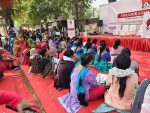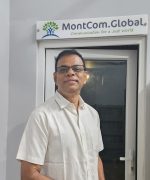By Rani Punnasseril
New Delhi, Nov. 10, 2024: A hospice in the Indian capital that has prepared nearly 7,500 people to face death with dignity celebrated its 30th anniversary with a variety of programs running over three days.
On November 9, the final day of the Shanti Avedna Sadan (Home of Painless Peace) celebrations, a roundtable and a symposium heard medical professionals and social workers stressing the need for integrating hospice services, and overcoming stigma around end-of-life care.
While principals from local nursing colleges in the city attended the roundtable, doctors and social workers participated in the symposium with the Avedna volunteers and trustees.
At the symposium on “Voicing and Acknowledging Hospice Care,” Luis Jose de Souza, a Catholic surgical oncologist who founded Shanti Avedna Sadan centers in Mumbai, Goa and New Delhi, addressed the ongoing need for policies supporting hospice care and the unique role the Delhi center has played in providing accessible, free services for patients.
De Souza shared his inspiration and journey in establishing Shanti Avedna Sadan. Reflecting on his early work with TATA Hospital in Mumbai, he described how his faith in God helped him navigate the initial challenges of founding a free palliative care center for cancer patients.
He emphasized the significance of providing hospice support, especially for patients exhausted by the financial burden of advanced cancer treatment. He said patients find “immense relief” in the center’s services.
The first center was opened in Mumbai on November 2, 1986. It was India’s first hospice to help terminally ill cancer patients in advanced stages to spend their last days in peace and love.
The centers are managed by the Sisters of the Holy Cross Menzingen.
De Souza earlier told an interview that he chose the Holy Cross nuns to manage the three branches because only they have the dedication and love for this work.
“They do it not for name, fame or gain, but only for the love of God.”
The second center was opened two weeks later at Loutolim in Goa. The Delhi center was opened on November 4, 1993. The Mumbai center has a capacity of 100 beds, and the Goa and Delhi centers have 20 and 36 beds, respectively.
Haris Beeran, a Member of Parliament, inaugurated the symposium where an Avedna volunteer called for uniform policies across states to care for the terminally ill.
The celebrations honored Sister Tabitha Joseph, the Delhi center’s administrator, and her team.
The celebrations began on November 7, with a gathering for families of former patients, offering comfort and gratitude. On November 8, the center brought together volunteers and trustees for a day of reflection and appreciation.
Father Jaisson Vadassery, executive secretary of the Commission for Migrants under the Conference of Catholic Bishops of India, highlighted the struggles migrants and refugees face in accessing palliative care, comparing their plight to travellers lost in a storm.
He emphasized that volunteers are the lighthouses guiding these individuals, but their efforts need stronger governmental support. “The backbone is voluntarism; it needs to be supported well by the policies of the government,” urged the lawyer priest. He also called for a partnership between grassroots efforts and state policies to ensure palliative care reaches all who need it.
Doctor Rakesh Garg from All India Institute of Medical Sciences in New Delhi, moderated the session, emphasizing the need for wider advocacy and accessibility in hospice care.
Beeran, a lawyer, supported the concerns raised, pledging to raise these issues in Parliament and advocating for policies that streamline hospice care registration, making services more accessible for patients and their families.
Aswin Desouza, surgical oncologist and one of the trustees, presented the way forward to the participants, emphasizing the importance of expanding palliative care services, raising awareness, and strengthening partnerships with various stakeholders to ensure broader access and quality care for patients.
The program concluded with a united pledge:
“We dedicate ourselves to being a light in the darkness for those who face the end of life. We commit to offering comfort, dignity, and love to cancer patients in their final journey, ensuring they are surrounded by peace and care. We vow to stand by them, honouring their courage and resilience, and providing palliative support that upholds their spirit and soothes their pain. In every action, we strive to be beacons of hope and kindness, illuminating their path with respect and compassion.”












Me too visited the place some twenty years back
It’s well run institute